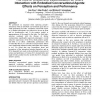Free Online Productivity Tools
i2Speak
i2Symbol
i2OCR
iTex2Img
iWeb2Print
iWeb2Shot
i2Type
iPdf2Split
iPdf2Merge
i2Bopomofo
i2Arabic
i2Style
i2Image
i2PDF
iLatex2Rtf
Sci2ools
CHI
2007
ACM
2007
ACM
The role of choice and customization on users' interaction with embodied conversational agents: effects on perception and perfor
We performed an empirical study exploring people's interactions with an embodied conversational agent (ECA) while performing two tasks. Conditions varied with respect to 1) whether participants were allowed to choose an agent and its characteristics and 2) the putative quality or appropriateness of the agent for the tasks. For both tasks, selection combined with the illusion of further customization significantly improved participants' overall subjective impressions of the ECAs while putative quality had little or no effect. Additionally, performance data revealed that the ECA's motivation and persuasion effects were significantly enhanced when participants chose agents to use. We found that user expectations about and perceptions of the interaction between themselves and an ECA depended very much on the individual's preconceived notions and preferences of various ECA characteristics and might deviate greatly from the models that ECA designers intend to portray. Au...
CHI 2007 | Embodied Conversational Agent | Human Computer Interaction | Participants Chose Agents | Various Eca Characteristics |
| Added | 30 Nov 2009 |
| Updated | 30 Nov 2009 |
| Type | Conference |
| Year | 2007 |
| Where | CHI |
| Authors | Jun Xiao, John T. Stasko, Richard Catrambone |
Comments (0)

